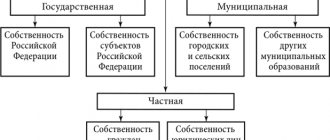What is the difference between a privatized apartment and your own?
- privatization means transferring state property to private property, that is, when the state.
property is transferred into the hands of citizens and they, in turn, acquire ownership of the state. property. And the state loses ownership of the privatized item. In the Housing Law to the question: What is the difference between privatizing an apartment and registering an apartment as a property? Thanks asked by the author Neurologist, the best answer is Registration of an apartment as a property can be based on something (inheritance, purchase and sale, privatization, etc.) - possible There are many reasons; privatization is one of the reasons for the emergence of property rights.
What is the difference between a privatized apartment and your own?
However, many citizens still have not decided what is more profitable - owning an apartment or living in it under a social tenancy agreement. According to lawyer Oleg Sukhov, president of the Guild of Real Estate Lawyers (GURN), it is necessary to take into account that both options have advantages and disadvantages. The obvious advantage of privatization is that a citizen becomes the full owner of residential real estate for a small amount (the amount required for paperwork).
The concept of “state real estate” in Russia is disclosed as property, property of the Russian Federation, constituent entities of the Russian Federation and representatives of municipal authorities. The listed power holders have the right to dispose of the real estate related to them. For example, they can rent out state real estate. The concepts of “municipal housing” (municipal housing stock) and “social rental housing” (social housing) are close in meaning to the concept of “state real estate”.
What does a privatized apartment mean?
Features of privatized and non-privatized housing. Is there a difference between the concepts of “privatization” and “property”. Advantages and disadvantages of each type. Useful legal advice.
When almost 30 years ago, Russian citizens first received the right to register for free privatization of the municipal housing in which they lived, the decision to privatize the apartment seemed to be the only correct one. Privatization quickly became a mass phenomenon. And after some time, people came to the conclusion that living in an apartment on social rent also has its advantages.
And since then, the debate about what is more profitable - to privatize housing or leave “everything as it is” has not subsided. There is no clear answer to this question; it all depends on the specific life situation of the residents. And what is good for some families is not at all suitable for others.
In this article we will talk in detail about the features of privatized and non-privatized housing. In particular, we will find out whether there is a difference between the concepts of “privatization” and “property”. Let's compare the advantages and disadvantages of each type. And on this basis we will give useful legal recommendations on what is the smartest thing to do in a given case.
What is the difference between a privatized apartment and your own?
This tax is calculated in such a way that the inventory value of the property is taken into account in the calculations. By the way, there has long been talk about taking the market value of the apartment into account. The owner of the property is fully responsible for maintaining the property in proper condition, so the tenant does not have to spend his money on major repairs.
You can privatize an apartment for free before the deadline established by the law “On the privatization of housing stock in the Russian Federation” and extended from 2010 to March 1, 2013. According to the Federal Law of the Russian Federation dated December 29, 2004 No. 189-FZ, on March 1, 2013, the law (Article 1, Article 2) loses force.
Assessing the need for privatization
- What is the right to use residential premises?
To make a decision in favor of privatization or against it is necessary to highlight the differences between a privatized apartment and a non-privatized one and determine how significant they are in each specific case. Non-privatized housing is objects owned by state or municipal authorities, which transfer to residents, on the basis of a social tenancy agreement, the right to live without the possibility of performing legally significant actions.
The difference between a privatized and non-privatized apartment according to a number of significant parameters is presented in the table:
| Options | Privatized objects | Municipal facilities |
| Ownership | Arises on the basis of privatization, the legal document is an extract from the Unified State Register of Real Estate | The property belongs to the local authorities, the residence document is a social rental agreement with the municipality |
| Carrying out legally significant actions | The owner has the right to sell, donate, bequeath, mortgage or lease his part | The tenant and his family have the right only to live |
| Maintenance costs | Lies on the owners | Refers to the responsibilities of local authorities |
| Move-in and eviction | It is possible to move in any persons without confirmation of family ties, the risks of own eviction are reduced to a minimum, even if there is debt | Unauthorized occupancy by third parties is not permitted; eviction is possible by decision of the municipality at virtually any time if the requirements are violated |
| Possibility of redevelopment | At our own discretion with the consent of the BTI and housing authorities | Subject to municipal permission |
| Payment of property taxes | Mandatory annually at the rate of 0.1% to 2% of the cadastral value of housing; in 2021, the last time a number of regions are allowed to pay on the basis of the inventory value | Residents are exempt from payment because there is no ownership of the property |
The undeniable advantages of privatization lie in obtaining absolute ownership of a property practically free of charge, including only payment for government services. Among the disadvantages, one should highlight the increase in maintenance costs, including liability in the event of force majeure situations.
When weighing the pros and cons when making a decision, you should pay attention to the following factors:
- Person status. For example, it is not advisable for a single pensioner with no relatives to take on additional financial expenses and service risks.
- Condition of the property. The privatized property of a “dilapidated” object requires major repairs at the expense of its own sources, and an illiquid plot of land will cause difficulties in the sale, while the right to further participation in the privatization process will be lost due to use.
The main differences between a privatized apartment and a non-privatized one
Looking through the assessments of realtors, it must be said that the percentage of citizens who have not privatized apartments is becoming smaller. However, some disadvantages of this process may make the remaining percentage of people wonder whether they really need all this.
Now let's look at this issue in the same way if your apartment or dacha is not privatized. Living in a municipal apartment under a social tenancy agreement, you will not be the owner, but the tenant, and the right to dispose of the apartment will be quite limited.
We recommend reading: Do you need temporary registration when moving to another city?
What is a “Privatized apartment”?
First of all, you need to clearly understand the terms.
Privatization is the process of transforming property from municipal to private, regulated by Federal Law No. 1541-1. The basis for privatization is a social tenancy agreement or a municipal order (currently used extremely rarely).
Privatization is an exclusively voluntary matter - a person cannot be forced not to do so. If municipal authorities for some reason strictly insist on privatization, this is a reason to go to court. A privatization deal carried out under pressure will be declared illegal.
A privatized apartment becomes the property of the individual who completed the transaction. If several people (individuals) live in an apartment, they all have the right to participate in privatization. Consequently, everyone becomes the owner of a proportional share in privatized housing.
Shared ownership does not imply division of the living space itself (especially if common areas cannot be divided). But each family member has the right to a certain part of the housing in monetary terms. And certain rights - for example, in the case of the sale of an apartment, each owner of the share must formalize consent to the sale and become a party to the transaction. The owner has the right to dispose of his share as he sees fit (if the norms of the Housing Code and the Civil Code of the Russian Federation are not violated).
What is the difference between a privatized apartment and your own?
The obvious advantage of privatization is that a citizen becomes the full owner of residential real estate for a small amount (the amount required for paperwork). As a result, the owner has the right to dispose of such property at his own discretion and desire: sell, bequeath, donate.
— Another positive side is the fact that the employer has the opportunity to improve his living conditions. Of course, the owner of the apartment also has this right, but there is a difference. The fact is that the owner of the apartment can only receive real estate of equal value, but the tenant can count on the minimum established by law.
What is property?
| Comparison | Characteristic |
| Peculiarity | Property owned by citizens may belong to them on several grounds. An apartment can be bought, inherited, or registered as a gift. At the same time, privatized housing is also considered property. This is one of the ways to get real estate into private hands. Not only real estate, but also movable property (a car, household items, collections and even securities) can be considered property, provided that documents are prepared - in the MFC, Rosreestr, traffic police, bank, etc. |
| Who is the owner? | The owner is an individual or legal entity (organization). Now ownership is formalized in the form of an extract from the Unified State Register of Real Estate (until 2021, a State Registration Certificate was issued). If we are talking about state property, then the manager is the municipality or a separate department, for example, the Ministry of Defense. |
| pros | 1. There are several ways to become an owner at once: purchase, receipt as a gift, inheritance, privatization (paid and free). 2. The ability to dispose of the apartment at your own discretion: sell, rent, include in inheritance, donate, mortgage, exchange. 3. Carrying out repairs and redevelopment without the consent of the previous owners - of course, in compliance with technical standards. 4. Registration and check-out from the apartment at the discretion of the home owner. 5. Receiving compensation for the seizure of property for the needs of the state (for example, a plot of land for laying a pipeline). |
| Minuses | 1. Maintenance of property in an apartment building. 2. The amount of utility bills is higher than in the case of housing and communal services for non-privatized housing. 3. Transfer of funds for major repairs of a residential building. 4. Risks of running into scammers when selling, renting or other real estate transactions. 5. Choosing housing based on location, square footage, living conditions, etc. |
Property concept
Ownership of real estate is the ownership of an object by a legal or natural person. It is impossible to privatize such housing.
The procedure for transferring ownership is also different. This could be a regular purchase and sale transaction or a gift or inheritance agreement.
The difference between privatized housing and non-privatized housing
- registration includes collecting papers for the apartment. It is necessary to prepare a rental agreement;
- registration requires obtaining a waiver from other persons. Often there are several residents;
- the refusal must be made in writing;
- copies of personal documents are provided;
- You should collect papers certifying timely payment of utilities.
The procedure for privatization and non-privatization of housing is a complex process of formalizing the powers of the owner. It is the process of obtaining rights to one’s own home, country house, or land plot. The process consists of legitimizing the right of ownership of the relevant property.
What is the difference between a municipal apartment and a privatized one?
83 of the Housing Code of the Russian Federation or loss of the right to use residential premises. Administrative measures may be applied to the tenant for damage to residential premises, in accordance with Art. 7.21 Code of Administrative Offenses of the Russian Federation. In addition, citizens may be held criminally liable for intentional or careless destruction or damage to property (Art.
My daughter and I won’t be able to privatize some part for ourselves?” “Citizens of the Russian Federation occupying residential premises in the state and municipal housing stock, including housing stock under the economic management of enterprises or the operational management of institutions (departmental fund), on the terms of social rent, have the right, with the consent of all adult family members living together, as well as minors aged 14 to 18 years to acquire ownership of these premises on the terms provided for by this Law, other regulations of the Russian Federation and constituent entities of the Russian Federation.
We recommend reading: How many meters should be from the house to the neighbor's fence
Rules for the privatization of municipal housing in 2021
- Re-registration of real estate is carried out free of charge. Only government fees are payable.
- Privatization is carried out entirely voluntarily.
- The privatization agreement has a standard form throughout the Russian territory.
- The opportunity to privatize a share in a municipal apartment, and not just the entire premises at once.
- The agreement on the transfer of rights to property is drawn up in one copy, regardless of how many people took part in the procedure. If necessary, all participants have the opportunity to make a copy and have it notarized.
We recommend reading: Changes in kosgu in 2021 for budgetary institutions
If a citizen is not against privatization, but simply does not want to take part in it, he needs to write a refusal and have it notarized. In this case, registration of ownership occurs without hindrance, and the person who renounces his share will have the right to live in the privatized apartment for as long as he wishes.
What is the difference between a private apartment and a privatized one?
Living in your own apartment or your own house, wanting this and striving to achieve it - all this is the norm for us, the natural order of things. Few people remember that just recently we were all just employers. And although the apartment was perceived as its own in Soviet times, in reality it was not so. The concept of private ownership of housing returned to the lives of Russian citizens only in 1990, since the adoption of property laws in the USSR and the RSFSR.
Specialists from real estate firms limit themselves to lengthy advice on whether it is worth privatizing an apartment or not. On the one hand, rents for municipal housing are rising every month. Privatization of an apartment is fraught not only with the difficulty of completing the necessary documents, but also with such “surprises” as stubborn opposition from one of the relatives. Elena from Moscow contacted Zastupnik.org asking whether she could privatize part of the apartment that she should receive under the program for relocation from dilapidated housing, if her ex-husband is against it. “Under the program for relocation from dilapidated housing, me, my ex-husband and daughter should receive a two-room apartment.
Privatization and property: what is the difference, what is the difference
Privatization is the transfer of municipal (state) property into private hands. Residential tenants who live in apartments under a social tenancy agreement have the right to privatization. If this is a land plot - a lease agreement or an act of transfer of land for indefinite use. Based on these documents, a person has the right to become the owner of real estate.
Is privatization different from registration of ownership? This question worries people who are just planning to transfer ownership of an apartment or already have separate housing. Despite the similarity of concepts, privatization has fundamental differences from property.
The essence and mechanism of privatization
Privatization of property is the process of transferring real estate from the original owner, represented by the state, to an individual - a citizen and members of his family.
Legal document for the procedure:
- social tenancy agreement for obtaining ownership of housing;
- a long-term lease agreement or an act of transferring land for indefinite use for the privatization of land plots.
The process of transferring real estate is carried out on a voluntary basis, the initiator is a resident citizen who has expressed a desire to register municipal real estate in his name. When privatizing an apartment, who is the owner depends on the number of persons involved in registering the transaction. If the transfer from the authorities passes to one individual, then the property after completion of the process will become his individual property, if to several participants, then each will own a certain share, and the real estate will become the object of shared ownership.
The implementation mechanism includes obtaining the consent of residents and submitting the following documents to the MFC:
- applications for the process;
- passports of residents and birth certificates of minor children;
- extracts from the Housing Office about the registered residents;
- certificates confirming early non-participation in the privatization of real estate;
- technical passport indicating the total area and cadastral value;
- agreement giving the right of residence or orders;
- consent of guardianship and trusteeship authorities with the participation of minors;
- notarized refusal of persons entitled to receive a share.
Thanks to the participation of the MFC in 2021, the process is extremely simplified, registration is carried out remotely to avoid queues, and photocopies of documents are made by specialists during a visit with simultaneous submission of documentation.
What is the difference between privatization and registration of ownership?
Registration of ownership is a broader concept than privatization. This concept includes concluding various contracts, donating real estate, opening an inheritance, and more. You need to know that registration of ownership and privatization must be formalized differently.
One of the main differences between these two terms is the procedure itself. The process of privatization of real estate is the same for everyone. Only those persons who have the rights to participate in the transaction can privatize housing. And the rules for registration of ownership depend on the type of real estate, as well as on the subjects of legal relations.
Is it necessary to register land ownership?
Common shared and common joint property have the same nature: they both imply a plurality of owners of the same property.
Only through privatization can a citizen legally become the full owner of a house or apartment. And no one will constrain him in his ability to manage his own housing. What conclusion can be drawn from such a difficult situation to resolve?
Volume. Registration of ownership is a broader concept than privatization, which includes, among other things, the purchase of real estate, its acceptance as a gift and inheritance, barter, and more.
Obtaining ownership rights is a very significant plus in the direction of housing privatization. If you have accumulated huge debts for utilities, then it is almost impossible to evict you from a privatized apartment, which cannot be said about a non-privatized apartment.
This is important to know: Privatization of a summer cottage in a gardening partnership in 2021
What is the difference between the rent of a privatized apartment and a non-privatized one?
The “final deadline” was announced for March 1, 2010, but in January the State Duma, in record time, in three readings (!), adopted a law postponing this event for another three years. Anyone who did not have time or delayed until the last minute with privatization can easily register their apartments as their property.
New housing will be provided based on the minimum permitted area per person registered in the apartment (according to Part 5 of Article 57 of the Housing Code of the Russian Federation). It will not be possible to dispose of non-privatized living space at your own discretion, that is, sell or donate it. After all, the owner is the state. Yes, and it is advisable to pay for housing carefully.
Privatization of apartment and registration
In general, registration requires permission in writing from all registered residents and permission from the authority with which the social tenancy agreement (landlord) was concluded. The latter can allow occupancy if, in the end, the living space for each tenant is no less than the “accounting norm.”
To make a positive decision on discharge, the court must have compelling reasons. The most common of them: • the tenant does not comply with the rules of the hostel established by law (causes inconvenience to neighbors, breaks property, etc.); • the citizen does not pay rent.



